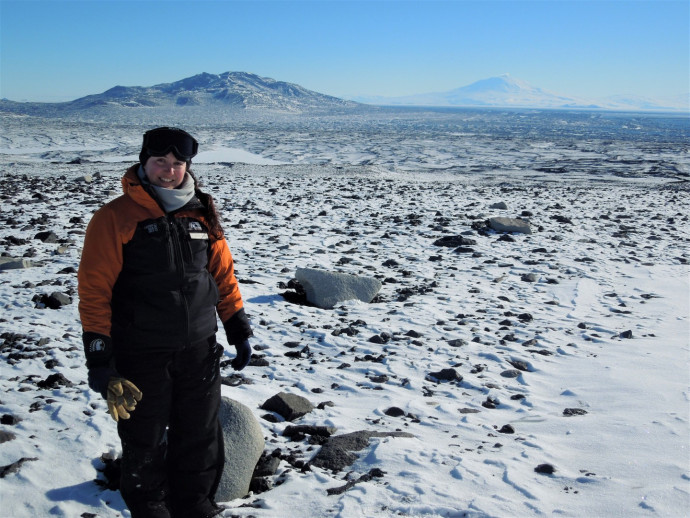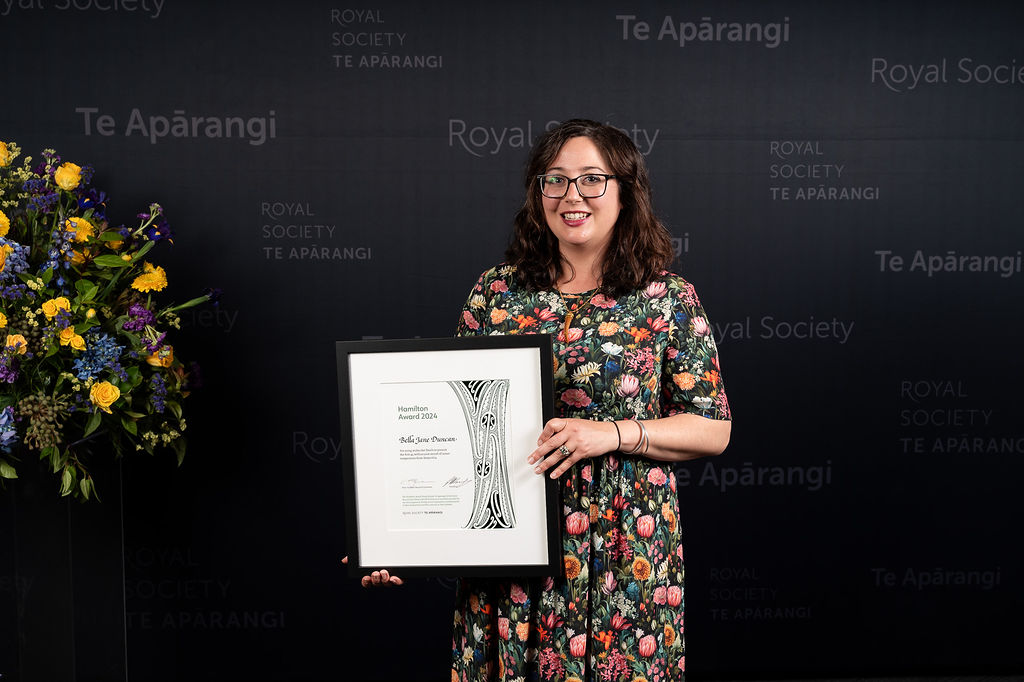2024 Hamilton Award: A 45-million-year Antarctic record to understand future climate change

Dr Bella Duncan, of Te Herenga Waka—Victoria University of Wellington, has been awarded the Hamilton Award by the Royal Society Te Apārangi for investigating how ocean temperatures in Antarctica have changed over 45 million years, including the historical temperature thresholds for ice sheet retreat. Her research indicates that the future effects of climate change will be stark.
 Bella, as lead author, and her team presented this record using molecular fossils of single celled organisms in the paper ‘Climatic and tectonic drivers of late Oligocene Antarctic ice volume’, published in Nature Geoscience. It presents a record of the links between atmospheric carbon dioxide, tectonics, ocean warming, and ice volume in the ancient past.
Bella, as lead author, and her team presented this record using molecular fossils of single celled organisms in the paper ‘Climatic and tectonic drivers of late Oligocene Antarctic ice volume’, published in Nature Geoscience. It presents a record of the links between atmospheric carbon dioxide, tectonics, ocean warming, and ice volume in the ancient past.
The results of the research paint a blunt picture of what the West Antarctic Ice Sheet looks like with increased atmospheric carbon dioxide – indicating that when carbon dioxide levels were similar to those projected for the coming century, there was substantial melt of the ice sheet. During those times, Antarctica, a land we usually think of as a hunk of ice, had areas of tundra vegetation. Bella’s research has provided clear evidence that if carbon-dioxide emissions continue unabated, humanity can expect major ice loss and sea-level rise over the coming decades and centuries.
Bella has been a pioneer of the use of ‘molecular fossils’ to understand the role of climate change on the evolution and variability of the Antarctic Ice Sheet. Before Bella’s work, scientific knowledge of past changes in ocean temperature around Antarctica during times of large ice melt was limited. The ability to reconstruct past ocean temperatures using fossil molecules preserved in the geological record of the Southern Ocean has revolutionised understanding of the influence that a warmer ocean could have on the stability of the ice sheet.
Bella is currently a Research Fellow at the Antarctic Research Centre, based at Te Herenga Waka—Victoria University of Wellington.
Since her paper’s publication, Bella has been asked to lead an international effort through the Scientific Committee of Antarctic Research (SCAR) to improve understanding of the archaeal molecular fossil-based method she used for reconstructing past ocean temperatures around Antarctica.
She is also part of an international team reviewing the global application of these methods, including the breakthroughs enabled by applying the cutting-edge machine learning.
Bella is a member of the science team for a project known as SWAIS2C, which will recover sediment cores from below the Ross Ice Shelf in Antarctica this coming summer. Bella is leading the organic geochemistry team, aiming to use molecular fossil-based methods to investigate the Antarctic environment during past collapses of the ice sheet.
The selection committee chose Bella for this award because of the enormous global relevance of the records she has generated, which are a key to understanding the climatic changes documented in sediment cores – particularly in hard to access areas of Antarctica and the Southern Ocean.
Bella says she is delighted and grateful to accept the Hamilton Award.
“This research, and my career so far, has been a team effort. The publication was many years in the making, and I’m so thankful to my co-authors who supported and encouraged me and added their wealth of knowledge to the paper. In particular I’d like to acknowledge Rob McKay, Tim Naish, Richard Levy and James Bendle for their mentorship, enthusiasm, and constantly motivating me to reach the next steps of my career.
“Part of the long journey of this publication has been having three children along the way. I can’t thank my family enough for their unwavering love and support, especially my husband Max and parents Jane and Rod. Sometimes science and parenthood aren’t an easy mix, and having my family there every step of the way has been essential to my success. My boys are why I do this. Climate change will influence every facet of their lives, and if I can use my work to brighten their future then it’s worth every challenge. This is for them.”
Bella is also the recipient of two grants from the Marsden Fund Awards one as an Associate Investigator on the research project ‘Past abrupt Antarctic ice sheet melt events and impacts on sea level and climate’, and the other as a Co-Principal Investigator for the project ‘Exploring the temperature-dependence of Earth’s biosphere over time and space’. Both are running until 2025.
Hamilton Award: Early Career Research Excellence Award for Science
For an early-career researcher for excellence in scientific research.
Citation:
To Bella Duncan for research which presents a novel 45-million-year record of ocean temperature from Antarctica and examines the ocean temperature thresholds for ice sheet retreat.
